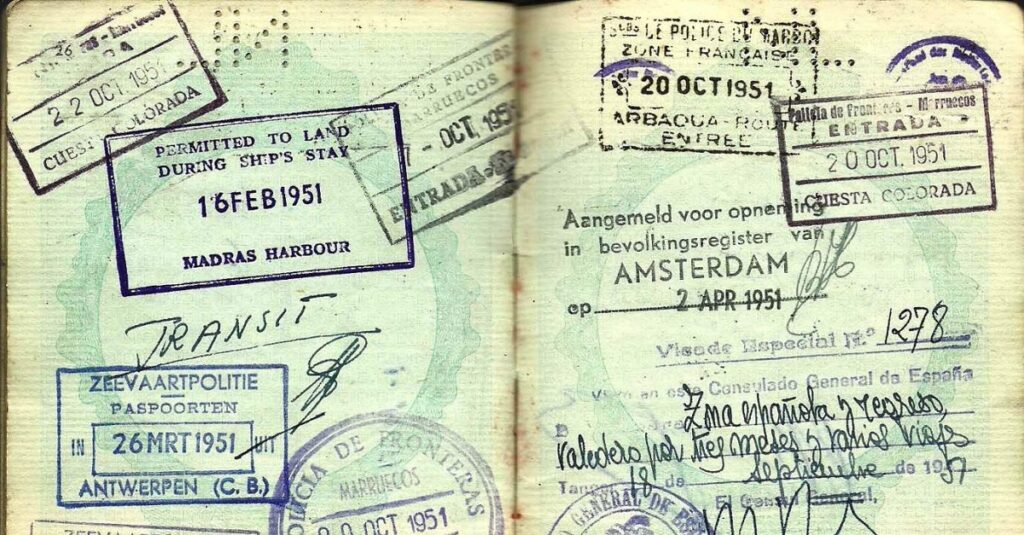
Almost every American has a family history that includes immigration to the United States. Except for the few Native Americans that resided here for thousands of years, the vast majority of us either immigrated or have ancestors that immigrated. Your genealogy search can get a little extra help from U.S. Citizenship and Immigration Services (USCIS) — they have a variety of resources to get you access to these records.
In many cases these immigration records are still available. There are a variety of reasons for wanting these records ranging from curiosity about one’s genealogy to a need for evidence in a current day immigration case.
How to Do a Genealogy Search through USCIS
While USCIS does offer a fee-based genealogy search service, it’s important to know that more recent records about your family may be available at no cost through a Freedom of Information Act request.
OPTION 1 | FOIA RequestGenerally, you may do a Freedom of Information Act request for information that is less than 100 years old. If you know the specific immigration records that you are trying to acquire and have some basic information about your family member, you can submit your own FOIA Request on behalf of a relative. You will need signature consent from that person or a death certificate. FOIA requests are typically free. Learn more >> |
OPTION 2 | Genealogy ProgramThe USCIS Genealogy Program is a fee-based service that provides you with access to historical immigration and naturalization records of deceased immigrants. The program can actively help you research immigration-related information about your family through five types of records. |
Types of Historical Information Available
The USCIS Genealogy Program can make five types of agency’s historical records available to aid your genealogy search:
Naturalization Certificate Files (C-Files), September 27, 1906 to March 31, 1956
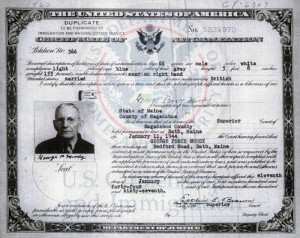
Naturalization Certificate Files (C-Files) are copies of records relating to all U.S. naturalizations in Federal, State, county, or municipal courts, overseas military naturalizations, replacement of old law naturalization certificates, and the issuance of Certificates of Citizenship in derivative, repatriation, and resumption cases. Standard C-Files generally contain at least one application form (Declaration of Intention and/or Petition for Naturalization, or other application) and a duplicate certificate of naturalization or certificate of citizenship. Many files contain additional documents, including correspondence, affidavits, or other records. Only C-Files dating from 1929 onward include photographs. Learn more >
Alien Registration Forms (Form AR-2), August 1940 to March 1944
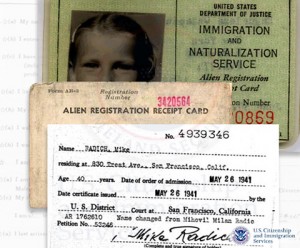
Alien Registration Forms (Form AR-2) are copies of approximately 5.5 million Alien Registration Forms completed by all aliens age 14 and older, residing in or entering the United States between August 1, 1940 and March 31, 1944. The two-page form called for the following information: name; name at arrival; other names used; street address; post-office address; date of birth; place of birth; citizenship; sex; marital status; race; height; weight; hair and eye color; date, place, vessel, and class of admission of last arrival in United States; date of first arrival in United States; number of years in United States; usual occupation; present occupation; name, address, and business of present employer; membership in clubs, organizations, or societies; dates and nature of military or naval service; whether citizenship papers filed, and if so date, place, and court for declaration or petition; number of relatives living in the United States; arrest record, including date, place, and disposition of each arrest; whether or not affiliated with a foreign government; signature, and fingerprint. Learn more >
Visa Files, July 1, 1924 to March 31, 1944
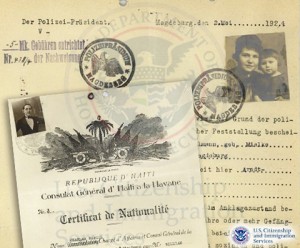
Visa Files are original arrival records of immigrants admitted for permanent residence under provisions of the Immigration Act of 1924. Visa forms contain all information normally found on a ship passenger list of the period, as well as the immigrant’s places of residence for 5 years prior to emigration, names of both the immigrant’s parents, and other data. Attached to the visa in most cases are birth records or affidavits. Also there may be attached other records such as: marriage, military, or police records. Learn more >
Registry Files, March 1929 to March 31, 1944
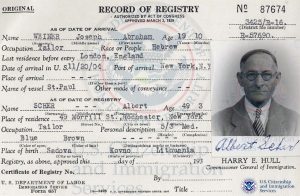
Registry Files are records, which document the creation of immigrant arrival records for persons who entered the United States prior to July 1, 1924, and for whom no arrival record could later be found. Most files also include documents supporting the immigrant’s claims regarding arrival and residence (i.e., proofs of residence, receipts, and employment records). Learn more >
A-Files, April 1, 1944 to May 1, 1951
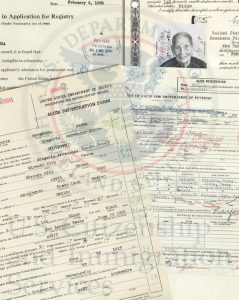
Immigrant Files, (A-Files) are the individual alien case files, which became the official file for all immigration records created or consolidated since April 1, 1944. A-numbers ranging up to approximately 6 million were issued to aliens and immigrants within or entering the United States between 1940 and 1945. The 6 million and 7 million series of A-numbers were issued between circa 1944 and May 1, 1951. Only A-File documents dated to May 1, 1951, are releasable under the Genealogy Program. Learn more >
Note: To request information on USCIS manifest arrivals prior to December 1982, write to the National Archives. To request records of naturalization prior to September 27, 1906, write to the clerk of court where the naturalization occurred.
How to Prepare a FOIA Request for your Genealogy Search
The easiest way to file a Freedom of Information Act request with USCIS is to file Form G-639, Freedom of Information/Privacy Act Request. There is no fee to file the form. You do consent to paying up to $25 for copying charges if the files are excessive. However, charges are an extremely rare occurrence. What’s more, the response is now provided on a CD via mail.
CitizenPath is a low-cost service that helps people prepare USCIS forms such as Form G-639, Freedom of Information Act/Privacy Act. Designed by immigration attorneys, our process will guide you through the form with step-by-step instructions so that you can easily complete the FOIA request in about 10 minutes. We’ll provide a neatly prepared form which you can file the same day, and we’ll provide you a set of filing instructions customized just for you. There is no credit card or sign up required to try it out.
Note to Reader: This post was originally published on September 25, 2014, and has been modified with improvements.
Source: USCIS
Want more immigration tips and how-to information for your family?
Sign up for CitizenPath’s FREE immigration newsletter and
SAVE 10%
on our immigration services



